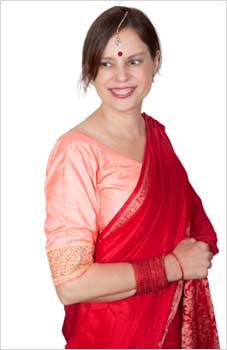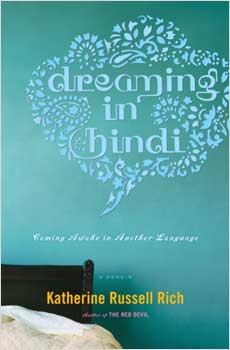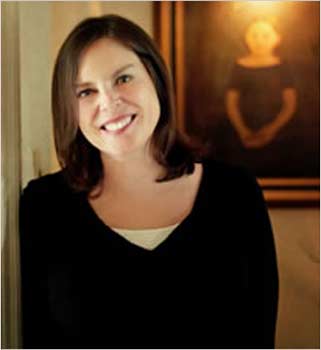Photographs: Courtesy: Katherine Rich's Web site
Katherine Russell Rich spots a Sikh mailman in the middle of Manhattan and gives in to her impulse to speak to him in Hindi. The mailman is a bit bewildered at the 50-year-old white American woman speaking to him in Hindi, but he politely chats with her for a few minutes.
He learns that she is a writer who spent a year in Rajasthan studying advanced Hindi and author of the book Dreaming in Hindi: Coming Awake in Another Language, which took some six years to write and revise. She has also been fighting breast cancer for more than two decades.
"Fighting cancer gave me the courage to start learning a new language when I was 40," says Rich, who has worked as an editor at magazines including GQ and Allure.
In her first book The Red Devil: To Hell with Cancer and Back, published to acclaim seven years ago, she wrote about her failed marriage, detection of cancer at age 32, its recurrence five years later, and how she has fought it.
Having miraculously survived and at an impasse in her career as a magazine editor, she says she spontaneously accepted a freelance writing assignment from The New York Times to go to India and do a story on the Tibetan spiritual leader, the Dalai Lama.
"I was thunderstruck by the place (India] and the language," she says. "I found Hindi to be musical and enchanting. Most people fall in love with a culture and then the language. I started with the language."
'Learning a new language can teach us about distant worlds'
Image: Rich speaks to a mailman in HindiPhotographs: Video: Paresh Gandhi
On her return to America, she took Hindi classes at New York University and before she knew it she was on her way to Udaipur, Rajasthan, to learn Hindi. She began working on her book before she went on her year-long trip to India.
The book is her discovery of India at its best ("the love you get from your new family is fantastic") and the worst ("the communal tension and riots"). It is also about interviews with linguistics experts and scientists on what happens in the brain when one learns a new language.
"It is also about what learning a new language can teach us about distant worlds and, ultimately, ourselves," she adds.
Sitting in a coffee shop in Manhattan, she confesses that though the book has received excellent reviews, some Indians are not very happy with an article on her in The New York Times.
In the interview with the newspaper, she talked about how when she gets into a New York cab with a desi driver, she breaks into one of her favourite songs, especially Yara Sili Sili from the movie Lekin, sung by the incomparable Lata Mangeshkar.
"It is a way of practicing my Hindi," Rich says, adding that some drivers thought she was coming on to them.
"I got a lot of flack from some Indians in New York," she says. "They thought I was perpetuating a stereotype."
Her observations could make some people may think of Indians as being cab drivers and nothing else, an Indian or two has complained. Maybe that's why, as she hums a few lines from her favourite song in the coffee shop, she adds, laughing: "They may throw us out!"
"Some people also make fun of my accent," she continues. "But surely I want to practice my Hindi. It isn't easy though. For, I say something in Hindi, and quite often the person talks to me in English. In some cases, people are offended. It is like, they feel that I think that they do not know English."
But many Indians have liked her book.
'Rich's gaze on the country is witty, empathetic, and intimate'
Image: The cover of Dreaming in HindiRich says one of the culture shocks in India involved privacy.
"People ask questions about your intimate life," she says. "Some people wanted to know why I wasn't married even though I was in my 40s. One gentleman wanted to know how much money I have. When I would not answer him, he said, 'Don't worry. We won't steal your money. We just want to know how much money you have in the bank.'"
And she left a host's home because of the privacy issue.
"I was so sorry in the end that I left the first family's home," she says. "I wasn't used to the lack of privacy and that was part of the reason, though, in fact, I did find myself unexpectedly loving the closeness at the same time. But really, the reason I left was over a misunderstanding -- my teacher became convinced that one of the father's friends was spreading bad rumours about me and poisoning the family. Now I think she was wrong."
'I really miss being in India'
Image: The authorPhotographs: Courtesy: Katherine Russell Rich web site
She has resumed her Hindi studies, "and I'm so happy to get back to it," she says. "The book took me so long to write and required so much time that I simply didn't have the time or focus to be studying Hindi. The writing took six years, and as time went on, my Hindi got rusty. I was watching Hindi movies here and there, but that was it, and as anyone who's studied a language knows, if you don't use it, you lose it."
"I vowed when the book was a wrap, I'd get back to it right away, and I have," she continues. "This year, I've begun meeting once a week with a terrific tutor -- Padmini Iyer, a Columbia (University) grad student who came here a couple of years ago from Bombay. She's smart and funny and has infinite patience, and beyond that she's studying Mandarin. So she understands how exhilarating the process of learning another language is, but also, how hard it is."
"We meet at this place in midtown and drink tea and talk about an hour, and I'm in heaven. Both because she's so interesting to talk to, but also because I really miss being in India and having the luxury of just sliding into Hindi whenever I want."
"Our meetings are a tiny echo of those days, and they remind me of how much I love India. There's a real flurry around the book right now, but as soon as that dies down, I'd like to get myself back there for a spell. Maybe go to Benaras and study with a tutor there for a bit, then go see my friends in Rajasthan, the ones I write about in the book. I really miss them," she says
'Hindi songs are such a great and pleasurable way to learn Hindi'
Image: Video interview with the writerPhotographs: Video: Paresh Gandhi
Is there anyone in particular she would like to visit?
"The friend I remember most is Nand Chaturvedi, a distinguished Hindi poet with whom I spent one afternoon a week talking," she says. "If there's a single person who has most changed the way I look at the world, it's Nandbabu. I write a lot about the things he said in my book. He is learned and wise, and even in English -- not his strongest language -- speaks so beautifully."
Have she read any Hindi books, especially the classics?
"That is one of my fondest dreams -- to read a Hindi classic in Hindi," she says. "The year I lived in India, I was enrolled in a pretty rigorous graduate programme. Every week, they'd assign us a short story by a writer like (Munshi) Premchand. They'd even supply us with a vocabulary list, but every week, I'd struggle and struggle but only make it only half way through. The sentences were just so tangled and mystifying."
She thought that everyone in India -- the ones speaking Hindi -- had to be a genius to understand them. But then one week, it got easier.
"I think that was the week we were reading that famous short story set in a mental institution, the one that's an allegory about Partition," she recalls. "It was extraordinary -- I made it through, I couldn't believe it. After that I got faster and faster. I wish there were a Hindi reading group for people at my level in New York City."
How is her interest in Hindi movie music continuing? Does she have any other favourite songs apart from Yara Sili Sili?
"I really like so many of them: Tujhse Naraz Nahi Zindagi, Tere Bin, Chupke Chupke Rat Din. An editor in India recently put me on to Geeta Dutt. Listening to Hindi songs is such a great and pleasurable way to learn Hindi. I collect people's favourites.
If any of your readers would like to tell me what theirs are, I'd be delighted to know. They could reach me through my Web site www.katherinerussellrich.com."




article